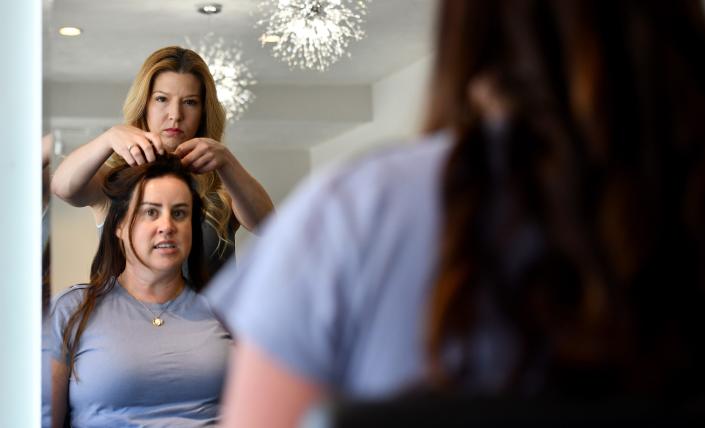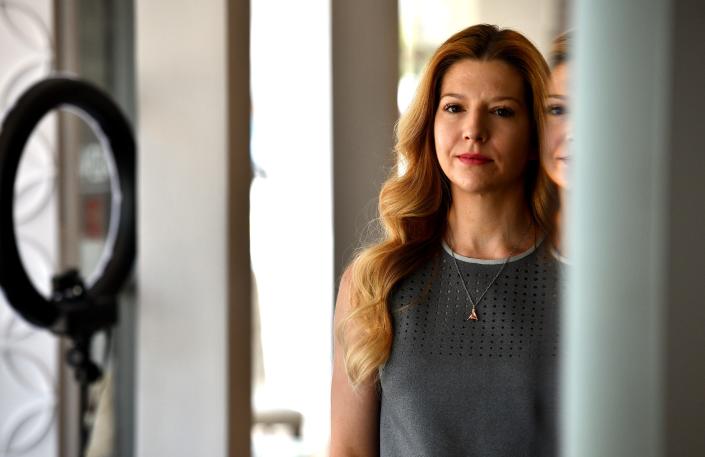Massachusetts beauty workers, schools may be required to train to "see" domestic violence
592 Salon hairdresser Katie Gustavsson styles hudson resident Liz Curtis' hair.SHREWSBURY - Stylist Katie Gustavsson has had that gut feeling in the past - that something was off with the client in her chair. It could have been the silent flow of tears that triggered the feeling, or the fading yellow of a bruise spotted in a place where there shouldn’t be a bruise.How, she wondered, does she initiate the conversation that could potentially save the client’s life? Or would a mention of domestic violence trigger greater abuse from a domestic partner?“What’s my bottom line?” asked Gustavsson, the new owner of Salon 592 in Shrewsbury. “The client is coming to me for a service. They are paying me, it’s a transaction.”Proposed legislation to require beauty workers to be trained to recognize signs of domestic violence could help them initiate those types of conversations and know how to help people who may be trapped in abusive relationships.“I think it’s great,” Gustavsson said, explaining t


SHREWSBURY - Stylist Katie Gustavsson has had that gut feeling in the past - that something was off with the client in her chair. It could have been the silent flow of tears that triggered the feeling, or the fading yellow of a bruise spotted in a place where there shouldn’t be a bruise.
How, she wondered, does she initiate the conversation that could potentially save the client’s life? Or would a mention of domestic violence trigger greater abuse from a domestic partner?
“What’s my bottom line?” asked Gustavsson, the new owner of Salon 592 in Shrewsbury. “The client is coming to me for a service. They are paying me, it’s a transaction.”
Proposed legislation to require beauty workers to be trained to recognize signs of domestic violence could help them initiate those types of conversations and know how to help people who may be trapped in abusive relationships.
“I think it’s great,” Gustavsson said, explaining that the hour's worth of training is a small price to pay to potentially help someone in distress. “What’s an hour?”
Gustavsson definitely thinks the bill makes sense.
“The more correct information we have, the better we can serve our clients,” Gustavsson said.
The bill, proposed by Reps. Christine Barber, D-Somerville, and Paul Donato, D-Medford, in the House and Sen. Cynthia Creem, D-Newton, in the Senate, would require beauty schools to incorporate a one-hour training curriculum in recognizing signs of domestic violence when the schools apply for renewal of their licenses. Individual estheticians, including hairstylists, barbers, nail technicians, masseuses and other beauty-industry workers, would be required to take an in-person or online course when their license comes up for renewal.
It’s not a new idea.
Campaigns across the world
Beauty workers associations nationally and internationally have been promoting similar campaigns under the “Cut it Out” logo for almost two decades. Beauty workers in Brazil and the United Kingdom have received training in recognizing signs of domestic violence. The Ohio attorney general launched a campaign in the Buckeye State in 2011 and recently expanded training to include signs of human trafficking. Other states, from Tennessee to Montana, are also requiring training for beauty operatives.
The Professional Beauty Association also endorses the training programs.
“All beauty professionals, whether hairstylists, barbers or estheticians, are in a unique position to recognize domestic abuse or human trafficking thanks to the nature of their business and the intimate relationships they develop with their clients,” said Maggie Staszcuk, the education program manager representing skin, hair and nail professionals through the Associated Skin Care, Associated Hair and Associated Nail Professionals.
Staszcuk has seen legislation across the country change to require domestic violence training and awareness for licensure. Cosmetology trade shows are beginning to offer awareness training at conventions, she said, adding that Milady, an organization that supports beauty workers, has launched the RISE Certification in Client Well-Being and Safety, which raises awareness of domestic abuse and human trafficking.
Opposition, said Barber, has come from some beauty schools that challenged the extra time needed to incorporate training into the curriculum, delaying the licensing of new workers. There is also the question of what kind of protections are available for beauty workers who may risk retaliation if they become involved in a client's domestic relationships.
While Barber recognizes the concern, the intent of the legislation is to provide an avenue to disseminate information.
"There is legal language in the bill to protect the safety of the workers," Barber said, adding that the intimate relationship between a client and beauty worker is built outside the framework of friends and family. The training is not meant as a way to intervene but rather as an opportunity to provide information from experts.
Broaching topic of domestic violence
The training would inform workers on how best to broach the topic of domestic violence - when and how it would be appropriate to say something, Barber said.
Creem believes the hourlong training is a small ask of the state's beauty industry workers.
"This is such a small thing, but with a big bang," Creem said, adding that it has had a good success rate in those communities where it has been enacted.
In Massachusetts, Middlesex County District Attorney Marion Ryan visits trade schools in her district, including the vocational high schools and dedicated cosmetology schools, to teach a course on recognizing domestic violence.
The first phase of the “Cut It Out Middlesex” program was initiated a decade ago with courses at local vocational and technical high schools. Approaching the training through high school programming was a way to create awareness around domestic violence at the earliest stage of students’ professional development.
The Middlesex program then worked in partnership with the national beauty school chain Empire Beauty School, and offered trainings conducted at Empire’s Middlesex campuses in Lowell, Framingham and Malden.
"When the DA does the trainings, she brings in local organizations within the community," Barber said, explaining that the groups, like Portal of Hope in Medford, offer workers local contacts for clients.
According to the DA’s office, the “Cut It Out” program was launched in Alabama in 2002 and has since expanded nationwide. Its Salons Against Domestic Abuse Fund is dedicated to mobilizing salon professionals and others to recognize signs of abuse and to fight the epidemic of domestic violence in communities across the United States.
“This is good,” said Luigi Romeo of Invidium Salon & Spa in Worcester. “Why not? If workers see signs (of abuse), that is good.”
Info packets helpful plus
Romeo suggested that information packets listing domestic violence hotline numbers and local organizations geared to helping victims escape domestic abuse situations, located at different stylists’ stations, or on the counters where clients can check in for their appointments, would also be helpful.
For Ilana Hill of Work Shop Salon in Somerville, a statewide training requirement makes sense rather than have individual salons sign up through a local or national beauty workers organization.
“If we are all trained and doing it, it makes sense,” Hill said.
To be effective, Hill said, information about domestic violence and ways to inform clients about local and statewide resources needs to be consistent and uniform in nature.
The stylists agree it all comes back to knowing what to say and how to approach the topic.
“It’s a touchy subject,” said Bledi Morava, owner of Scizzors in Shrewsbury. He conceded that the required training promoted by the proposed legislation would be “a good start.” But he also wonders whether stylists would have enough time to enter into that type of dialogue, as well as the necessary tact to broach the subject.
“Would it ruin the flow” between the stylist and their client, Morava wondered. “I can see it go sideways and not be as useful in the way the Legislature hopes it would be.”


Gustavsson also recognizes that those types of conversations would be “tricky and sensitive.” She would welcome training and encourage her staff to participate as well.
“We need to know how to lead the conversation in a way that would cause no harm. We need to know what the wrong thing would be to say, as well,” Gustavsson said, acknowledging the need for more information.
Beauty workers play such an important yet underrated role in recognizing signs of domestic abuse. They see changes in demeanor and see the hidden bruises, the scratches, the client who comes in with a partner who takes over the appointment, dictating hair style, length and color, nail color and even speaking for the client.
Donato, who filed the legislation, said that it’s those relationships between client and worker that can lead to breaking the cycle of domestic abuse.
“Many times women go in and confide in the hairdresser,” Donato said. He recognizes the importance of the relationship between workers in the beauty industry and clients, and hopes to keep encouraging workers with the mantra “See something, say something.”
“It’s an opportunity for workers to ask if everything is OK at home, to encourage clients to seek assistance,” Donato said.
This article originally appeared on Telegram & Gazette: Mass. could join other states to train beauty workers in signs of abuse
What's Your Reaction?

















